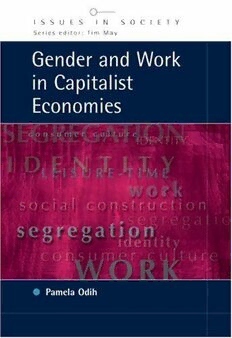
Gender and Work in Capitalist Economies (Issues in Society) PDF
225 Pages·2007·2.304 MB·English
Most books are stored in the elastic cloud where traffic is expensive. For this reason, we have a limit on daily download.
Preview Gender and Work in Capitalist Economies (Issues in Society)
Description:
From the industrial revolution through to more recent advances in information technology, radical changes in working practices have accelerated rates of production to previously unimaginable levels. The establishment of wage relations, in the second half of the 19th Century, precipitated the rise of the 'employment society' and a movement towards synchronized work. Industrialization epitomized the capitalist definition of work time. In Gender and Work in Capitalist Economies, Pamela Odih advances a politics of gender and time, exploring the sociological aspects of work. This book provides a dynamic intervention into Marxist analysis of time and capitalist accumulation, and looks at how in contemporary regimes this translates as the universal appropriation of women’s labour time. Pamela Odih reasons that it is a disconcerting fact of global manufacturing, that accelerated turnover gains have become increasingly dependent on the exploitation of a spatially disaggregated, feminized global assembly-line. The book explores: Industrial and post-industrial times as moments in a longer-term trend Manufacturing in the 24 hour economy Accelerated rates of disaggregated production Gender and Work in Capitalist Economies is key reading for students of gender studies, sociology, organizational analysis and economic history.
See more
The list of books you might like
Most books are stored in the elastic cloud where traffic is expensive. For this reason, we have a limit on daily download.
